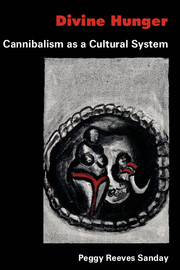Book contents
- Frontmatter
- Contents
- Preface
- Acknowledgments
- Introduction
- The symbols that give rise to a cannibalistic consciousness
- 3 The mysteries of the body: Hua and Gimi mortuary cannibalism
- 4 The androgynous first being: Bimin-Kuskusmin cannibalism
- 5 Cannibal monsters and animal friends
- The mythical chartering and transformation of cannibal practice
- Notes
- References
- Index
4 - The androgynous first being: Bimin-Kuskusmin cannibalism
Published online by Cambridge University Press: 05 June 2012
- Frontmatter
- Contents
- Preface
- Acknowledgments
- Introduction
- The symbols that give rise to a cannibalistic consciousness
- 3 The mysteries of the body: Hua and Gimi mortuary cannibalism
- 4 The androgynous first being: Bimin-Kuskusmin cannibalism
- 5 Cannibal monsters and animal friends
- The mythical chartering and transformation of cannibal practice
- Notes
- References
- Index
Summary
Bimin-Kuskusmin reject the view that any parts of human bodies can become “food” (yemen) in any ordinary sense. They do acknowledge, however, that the restricted consumption of certain parts of certain persons by particular social others in special contexts and in a prescribed manner is of major ritual importance. And the complex symbolism that marks these contexts, beliefs, and acts is densely articulated with other realms of Bimin-Kuskusmin cultural construction and social action.
About 1,000 Bimin-Kuskusmin live in rugged mountainous terrain in West Sepik Province of Papua New Guinea. They have known about Europeans since 1912 but did not experience direct contact until 1957. When Fitz John Porter Poole studied them from 1971 to 1973, such contact was still quite limited. Most of the population had not seen a European and the influx of Western technology was not in evidence beyond the use of steel tools.
The Bimin-Kuskusmin exhibit many of the features associated with Hua and Gimi cannibalism. Pig herds are tiny by New Guinea Highland standards and are replenished by capturing feral pigs. The marriage pattern “turns back” as most (80 percent) marriages are within the tribe. The remaining marriages are almost always contracted with Oksapmin groups who threaten Bimin-Kuskusmin political and economic integrity. These alien wives physically epitomize the Bimin-Kuskusmin conception of evil. The Bimin-Kuskusmin also have a monistic view of reality.
- Type
- Chapter
- Information
- Divine HungerCannibalism as a Cultural System, pp. 83 - 101Publisher: Cambridge University PressPrint publication year: 1986



